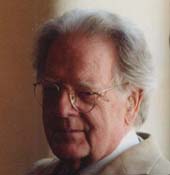Thinking about the recent horrors of runaway laissez-faire capitalism and what its alternative might be has brought me around to this entry in one of Frye’s “Third Book” notebooks:
Elie Wiesel, Legends for our Time. The last chapter, “A Plea for the Dead,” describes how nobody made any real fuss when six million Jews were murdered in Germany. Nobody to blame, except everybody. This is the kind of thing that makes it impossible for me to be a Buddhist, to accept ignorance and enlightenment as ultimate categories. The terrible burden of guilt simply has to be accepted: we can’t cast it off even on Christ.
What we can do about it involves organization — moral organization. Communism cannot produce this: it’s only the other side of capitalism, and accepts all its economic-man stereotypes. Teaching people one by one to be more sympathetic is futile. Western organization is the key, though no Western society has it. Our fumblings for “participatory democracy” really have as their goal a society in which one almighty yell can go up, almost automatically, when East Pakistan or black Rhodesia or whatever gets out of line with our moral sense. We don’t really lack moral feelings; what we lack is a social structure in which to embody them. (CW 9, 321)
In the absence of such a moral social structure we get the Tea Party, which is itself a creation and a tool of a deeply entrenched and self-serving oligarchy. (That is, the top 1% of the population that owns 38% of the wealth and takes in 25% of the income — and still demands tax cuts.)


I shudder.
I rage.
It’s a remarkable statement. Does anyone know more specifically what kind of organization Frye had in mind? Am I completely jaded in believing that as soon as you have an organization, you have an ideology that, if not completely usurping morality, significantly restricts its application?
I remember last year at this time when it looked like Uganda would start exterminating gays, and I heard not a single Catholic make a fuss about it, and those of us in the Anglican Church who made a fuss were… not listened to. (Catholics and Anglicans together make up the majority in Uganda.) I would love to be proven wrong, but every organization seems to me to be morally restricted by its own ideological investments.
Hi Clayton. Yes, I’m wondering about that myself. And I must say that I was a little surprised to see Frye saying, “Teaching people one by one to be more sympathetic is futile.” Ouch. I’ve been assuming that’s what I’m doing as a teacher and that it’s the best way to do it. For the world to be a much better place probably doesn’t require anywhere near a majority of good people. It just requires a determined and capable minority, perhaps only in the single digits as a percentage. The world is such an unspeakably shitty place that most people would abandon it in a moment if they really thought there was another option available to them, and it would only take a certain degree of critical mass of love and decency to accomplish that. Sadly, we’ve never reached that threshold, but we still might.
I’m guessing by “organization” Frye is not necessarily talking about an instituition walled in on all sides by ideology. I suspect he means something more like the mobilization of people who are self-aware enough to be motivated by primary concerns rather than secondary ones — maybe something like an analogy to the church militant. Frye wasn’t averse to belonging to organizations: his affection for and commitment to the CCF as a young man is pretty clear. In later life, of course, he was an exemplary member of the university community, and he liked to remind people that the university is the “engine room of society.” And, at the very end of his life, he admitted to being a lifelong “plainclothesman” for the United Church. But, that said, he does seem to be talking about something quantitative rather than qualitative here. There just isn’t enough goodness in this world. But the little there is must rally somehow to drive events rather than merely respond to them.